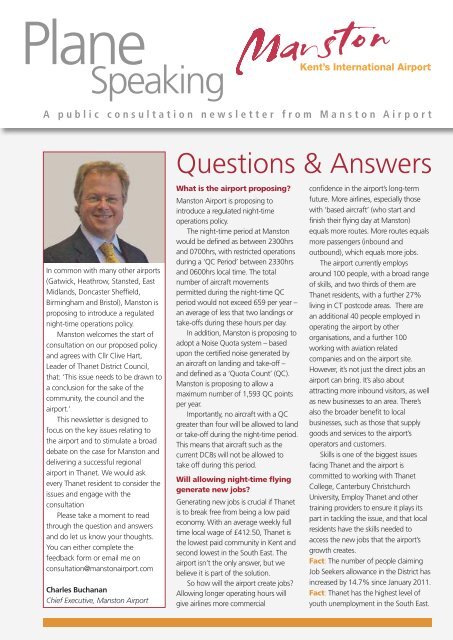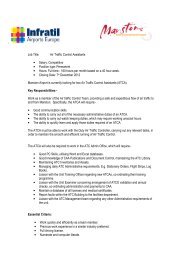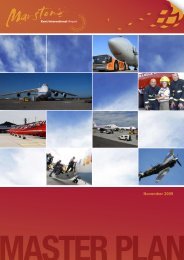You also want an ePaper? Increase the reach of your titles
YUMPU automatically turns print PDFs into web optimized ePapers that Google loves.
<strong>Plane</strong><br />
Speaking<br />
A p u b l i c c o n s u l t a t i o n n e w s l e t t e r f r o m M a n s t o n A i r p o r t<br />
In common with many other airports<br />
(Gatwick, Heathrow, Stansted, East<br />
Midlands, Doncaster Sheffield,<br />
Birmingham and Bristol), <strong>Manston</strong> is<br />
proposing to introduce a regulated<br />
night-time operations policy.<br />
<strong>Manston</strong> welcomes the start of<br />
consultation on our proposed policy<br />
and agrees with Cllr Clive Hart,<br />
Leader of Thanet District Council,<br />
that: ‘This issue needs to be drawn to<br />
a conclusion for the sake of the<br />
community, the council and the<br />
airport.’<br />
This newsletter is designed to<br />
focus on the key issues relating to<br />
the airport and to stimulate a broad<br />
debate on the case for <strong>Manston</strong> and<br />
delivering a successful regional<br />
airport in Thanet. We would ask<br />
every Thanet resident to consider the<br />
issues and engage with the<br />
consultation<br />
Please take a moment to read<br />
through the question and answers<br />
and do let us know your thoughts.<br />
You can either complete the<br />
feedback form or email me on<br />
consultation@manstonairport.com<br />
Charles Buchanan<br />
Chief Executive, <strong>Manston</strong> <strong>Airport</strong><br />
Questions & Answers<br />
What is the airport proposing?<br />
<strong>Manston</strong> <strong>Airport</strong> is proposing to<br />
introduce a regulated night-time<br />
operations policy.<br />
The night-time period at <strong>Manston</strong><br />
would be defined as between 2300hrs<br />
and 0700hrs, with restricted operations<br />
during a ‘QC Period’ between 2330hrs<br />
and 0600hrs local time. The total<br />
number of aircraft movements<br />
permitted during the night-time QC<br />
period would not exceed 659 per year –<br />
an average of less that two landings or<br />
take-offs during these hours per day.<br />
In addition, <strong>Manston</strong> is proposing to<br />
adopt a Noise Quota system – based<br />
upon the certified noise generated by<br />
an aircraft on landing and take-off –<br />
and defined as a ‘Quota Count’ (QC).<br />
<strong>Manston</strong> is proposing to allow a<br />
maximum number of 1,593 QC points<br />
per year.<br />
Importantly, no aircraft with a QC<br />
greater than four will be allowed to land<br />
or take-off during the night-time period.<br />
This means that aircraft such as the<br />
current DC8s will not be allowed to<br />
take off during this period.<br />
Will allowing night-time flying<br />
generate new jobs?<br />
Generating new jobs is crucial if Thanet<br />
is to break free from being a low paid<br />
economy. With an average weekly full<br />
time local wage of £412.50, Thanet is<br />
the lowest paid community in Kent and<br />
second lowest in the South East. The<br />
airport isn’t the only answer, but we<br />
believe it is part of the solution.<br />
So how will the airport create jobs?<br />
Allowing longer operating hours will<br />
give airlines more commercial<br />
confidence in the airport’s long-term<br />
future. More airlines, especially those<br />
with ‘based aircraft’ (who start and<br />
finish their flying day at <strong>Manston</strong>)<br />
equals more routes. More routes equals<br />
more passengers (inbound and<br />
outbound), which equals more jobs.<br />
The airport currently employs<br />
around 100 people, with a broad range<br />
of skills, and two thirds of them are<br />
Thanet residents, with a further 27%<br />
living in CT postcode areas. There are<br />
an additional 40 people employed in<br />
operating the airport by other<br />
organisations, and a further 100<br />
working with aviation related<br />
companies and on the airport site.<br />
However, it’s not just the direct jobs an<br />
airport can bring. It’s also about<br />
attracting more inbound visitors, as well<br />
as new businesses to an area. There’s<br />
also the broader benefit to local<br />
businesses, such as those that supply<br />
goods and services to the airport’s<br />
operators and customers.<br />
Skills is one of the biggest issues<br />
facing Thanet and the airport is<br />
committed to working with Thanet<br />
College, Canterbury Christchurch<br />
University, Employ Thanet and other<br />
training providers to ensure it plays its<br />
part in tackling the issue, and that local<br />
residents have the skills needed to<br />
access the new jobs that the airport’s<br />
growth creates.<br />
Fact: The number of people claiming<br />
Job Seekers allowance in the District has<br />
increased by 14.7% since January 2011.<br />
Fact: Thanet has the highest level of<br />
youth unemployment in the South East.
<strong>Manston</strong> agrees with Cllr Clive Hart, Leader of Thane<br />
‘This issue needs to be drawn to a conclusion for the<br />
Situated just 60 miles east of London, <strong>Manston</strong> <strong>Airport</strong>'s runway is 2,752<br />
metres long x 61 metres wide.<br />
Will night flight restrictions<br />
hinder the airport’s growth?<br />
Our Master Plan, published in 2009,<br />
shows the airport could grow to<br />
handle 2.29m passengers and<br />
167,500 tonnes of freight by 2018.<br />
At this level of activity over 2,000<br />
people would be employed in<br />
operating and supplying the airport,<br />
with a further 1,000 jobs supported<br />
in the wider economy. We recognise<br />
that the current economic situation<br />
may have delayed slightly the date<br />
when we reach these levels, and we<br />
still believe that it remains a case of<br />
‘when, rather than if’ the airport<br />
achieves these targets.<br />
Importantly it’s been estimated<br />
that the airport would generate<br />
£65m a year for the local economy<br />
when the airport’s Master Plan – a<br />
blueprint for its future – is realised.<br />
The airport's land covers 296<br />
hectares.<br />
To succeed <strong>Manston</strong> needs ‘based<br />
aircraft’, those which start and finish<br />
their flying day at <strong>Manston</strong>. This will<br />
increase the number of routes,<br />
increase passenger numbers and<br />
make the airport’s operation more<br />
efficient.<br />
<strong>Manston</strong> is already an important<br />
UK airport for freight thanks to its<br />
very quick turnaround time, which is<br />
better than all other UK airports.<br />
This ensures an extra day’s shelf life<br />
for fresh produce passing through<br />
<strong>Manston</strong>, compared to other<br />
airports. The restricted operation that<br />
<strong>Manston</strong> has limits the airport’s<br />
ability to attract new business.<br />
<strong>Manston</strong> must be able to compete<br />
with other airports in terms of the<br />
times it can handle flights.<br />
<strong>Manston</strong> isn’t operating at<br />
daytime capacity so why does<br />
it need night flights?<br />
For <strong>Manston</strong> to attract new airlines it<br />
needs to be able to compete on an<br />
equal basis with other airports.<br />
Airlines only make money when<br />
they are flying and operate to very<br />
tight time and route schedules. At<br />
the moment no airline will base<br />
aircraft here with the current flying<br />
time restrictions, that limit their<br />
opportunity to use their aircraft to<br />
the maximum, when they can do so<br />
at other airports.<br />
Our fresh-produce freight<br />
customers need greater flexibility.<br />
When crops are picked during the<br />
day, packed and loaded, they depart<br />
in the evening and land in the UK at<br />
night to stock the supermarkets’<br />
shelves. Arrival time restrictions<br />
critically hinder <strong>Manston</strong>’s ability to<br />
secure more of this type of business,<br />
despite our great reputation for<br />
service and unloading times. Soaring<br />
all year round demand for fresh fruit<br />
and vegetables presents a massive<br />
opportunity for <strong>Manston</strong>.
t District Council, that:<br />
sake of the community, the council and the airport.’<br />
Does Thanet District Council’s<br />
own report ‘challenge’ the<br />
airport’s own economic impact<br />
study?<br />
No. The authors of the Council’s report<br />
concluded: ‘…we are satisfied with the<br />
approach and values used for the<br />
economic assessment.’ It added: ‘The<br />
overall approach conforms to what we<br />
would consider ‘industry standard’ for<br />
an economic impact assessment of this<br />
kind.’ The authors also acknowledged<br />
that they had only ‘relatively minor<br />
queries’. So, does the Council’s<br />
conclusion that their own expert’s<br />
report ‘challenges the findings’ of the<br />
airport’s economic impact assessment<br />
seem fair?<br />
<strong>Manston</strong> is challenging the<br />
consultant’s conclusions that we have<br />
underestimated the potential adverse<br />
noise impacts. The information<br />
submitted to the Council was<br />
undertaken in accordance with<br />
standard industry practice and<br />
Government guidance by recognised<br />
expert noise analysts. In addition the<br />
<strong>Manston</strong> currently offers flights to many European destinations.<br />
report acknowledges that the sound<br />
insulation programme proposed by the<br />
airport to mitigate the impacts on the<br />
most adversely affected properties<br />
“goes further than that required by<br />
government guidance...”.<br />
Can <strong>Manston</strong> become a regional<br />
airport?<br />
We believe it can. <strong>Manston</strong> has one of<br />
the longest under-used runways in the<br />
country. The government, and the air<br />
travel industry, has recognised that<br />
there is a shortage of runway capacity<br />
serving London and the South East.<br />
Heathrow is operating at 99% capacity,<br />
and Gatwick and Stansted aren’t able<br />
to build additional runways.<br />
As a result the Mayor of London,<br />
Boris Johnson, and others have<br />
revitalised proposals for an airport<br />
either in the Thames Estuary or on the<br />
North Kent Coast. The initial cost<br />
estimate of £50bn to build, the need to<br />
close Heathrow to give it a chance of<br />
being financially viable, and the impact<br />
that would have on the economy of<br />
the Thames Valley makes the Estuary<br />
airport a non-starter. If that’s the case,<br />
what’s the answer? We believe it is<br />
making the most out of existing<br />
airports which could serve London<br />
better – and <strong>Manston</strong> is one of those.<br />
Qualified staff monitor the airspace over Thanet and communicate with pilots from the airport's air traffic control tower.
<strong>Manston</strong> recently played its part in bringing world-renowned Cirque du Soleil to the UK for its latest national tour when<br />
the airport welcomed two Boeing 747-400 freighters carrying 80 tonnes of staging and equipment each.<br />
Can <strong>Manston</strong> improve travel<br />
times to London?<br />
The plans to improve travel times<br />
between Ramsgate and London by<br />
upgrading of the rail line to Ashford and<br />
We want your feedback<br />
fast access to high speed train travel will<br />
strengthen <strong>Manston</strong>’s position. There’s a<br />
strong case for a <strong>Manston</strong> Parkway<br />
station to serve the island and further<br />
boost the local economy. However,<br />
without the success of the airport which<br />
can flow from an acceptance of limited,<br />
managed and mitigated night flights<br />
the argument for these improvements is<br />
significantly weakened.<br />
For more information: www.manstonairport.com or www.thanet.gov.uk • Email consultation@manstonairport.com<br />
Please take a moment to let us and Thanet District Council know your thoughts on our proposed night-time flying<br />
policy and the future of <strong>Manston</strong> <strong>Airport</strong>. Post this form to <strong>Manston</strong>, Kent’s International <strong>Airport</strong>, PO Box 500,<br />
<strong>Manston</strong>, Kent. CT12 5BL. Alternatively, email consultation@manstonairport.com and consultation@thanet.gov.uk<br />
Your comments may also be forwarded to Thanet District Council.<br />
Name:<br />
Address:<br />
Postcode<br />
!




